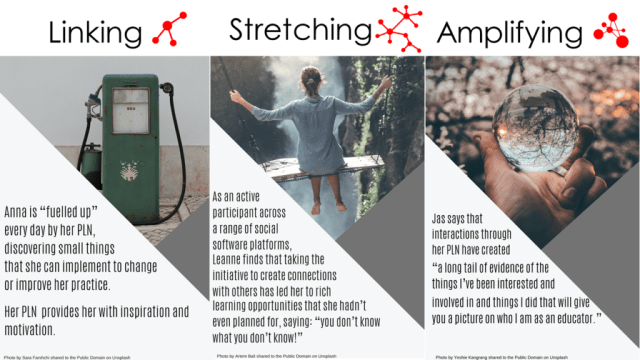In this post, you will find an overview of my presentation which I gave at the National Education Summit in Brisbane, where I presented in the Capacity Building, School Libraries Strand.
To give you a summary of my presentation, here is the abstract describing what I shared:
PROFESSIONAL LEARNING FOR CONNECTED TEACHER LIBRARIANS:
LINKING, STRETCHING AND AMPLIFYING
Teacher Librarians (TLs) use both online and offline connections to maintain and expand their professional knowledge and currency. Known as the PLN, or Personal Learning Network, this mode of professional learning allows TLs to enhance their knowledge and skills, develop a positive sense of self and advocate and educate others beyond their immediate context. However, developing and maintaining a PLN can be time-consuming, and managing effective learning within dynamic and constantly changing networks presents a challenge for TLs already responding to multiple demands.
This presentation presents a new and innovative way to understand and manage professional learning through the PLN. Research exploring the experiences of 13 teachers from varied geographical locations revealed that interactions through a PLN involve complex connections which offer linking, stretching or amplifying learning experiences. Awareness of these learning experiences may empower teacher librarians to identify the strategies and online spaces that most closely align with their learning needs and goals, creating opportunities for transformative pedagogical, personal and public professional learning.
Participants can expect to leave this presentation with a fresh understanding of innovative, practice-based professional learning and insights into how linking, stretching and amplifying learning experiences create flexible, accessible and highly personal engagement within their PLN.
New to the concept of the PLN?
Prior to the presentation, I shared this blog post, to introduce the concept of the PLN and set the scene for my conference presentation:
Understanding Personal Learning Networks: Foundations to Linking, Stretching and Amplifying
My research
My recently completed research explored the experience of thirteen teachers (six of whom were involved with or leading school libraries), who engaged with PLNs for the purposes of professional learning. I made many discoveries thanks to the generosity of these thirteen teachers, who gave me valuable insights into what they learnt through their PLNs, how they learnt and why they chose to develop this type of network. If you are interested, you can access the entire thesis here.
In this presentation, I spoke about the concepts of linking, stretching and amplifying; three different types of learning experiences which I identified across the stories of the thirteen participants.
Linking, stretching and amplifying are not measures of a teacher’s capacity for professional learning through a PLN.
They do not build on each other, although they do describe different (and increasing) levels of complexity and sophistication.
Teachers move between linking, stretching and amplifying depending upon their learning needs, their context and their learning capacity at a particular point in time.
This brief video gives you some insight into what each of these learning experiences entails:
What is this presentation really all about? It’s all about connecting.
TLs are amazing connectors.
TLs connect students with the right book, at the right time, whether that is the perfect novel for leisure reading, the most engaging picture book at a reading level suitable for a beginning reader, or a range of relevant, credible and high quality information sources to support developing research skills.
TLs connect their colleagues to high quality pedagogical and content focused resources which are aligned with the curriculum, and at the appropriate level for a particular group of learners.
TLs connect with the school community through whole school events and activities including book clubs, parent libraries and cultural celebrations.
TLs connect with each other – through networks, online and offline, through professional organisations, email listservs and various social media platforms.
The connections TLs initiate and maintain can be the lifeblood of the school, and yet, these connections can be difficult to describe, hard to measure and are often understood by few.
It is not surprising that TLs have developed PLNs (personal learning networks) to maintain and expand their professional learning opportunities and to offer support to others and advocacy for their profession; however, when it comes to capturing exactly how learning happens through PLNs and therefore providing evidence of the value of professional learning through the PLN, there is a lack of shared language and understanding.
Research such as this provides a shared language to describe the type of learning that happens in a PLN.
A shared language
Having a shared language means that it becomes easier to understand and analyse the types of learning practices that are happening, thereby enhancing professional learning experiences through the PLN. Using terms such as linking, stretching and amplifying may help to:
- Conceptualise the different ways that learners interact with others through the PLN
- Identify the different learning purposes that are driving these connections
- Perceive patterns in different interactions and
- Plan future interactions.
Share your thoughts
I’d love to know what you think. Do linking, stretching and amplifying resonate with you? Do they describe or capture some of your learning experiences through your PLN?
Which do you engage with the most? Why?
Are there other ways you would describe your learning experiences that these three do not capture?
Drop me a line in the comments, or send me an email via the contact page :).







One thought on “Linking, Stretching and Amplifying at the National Education Summit in Brisbane”